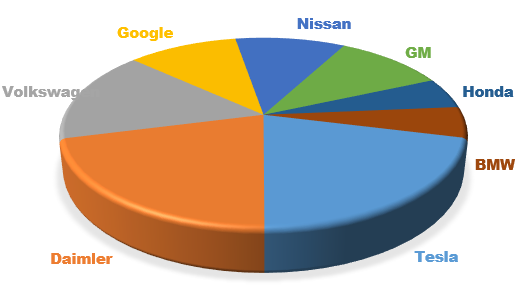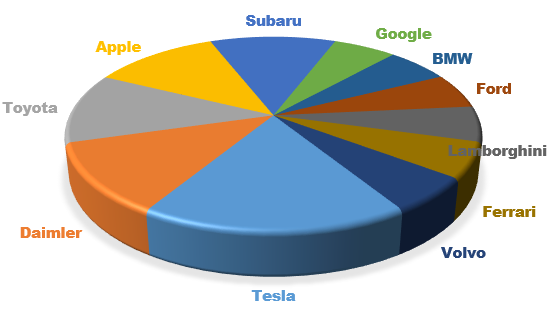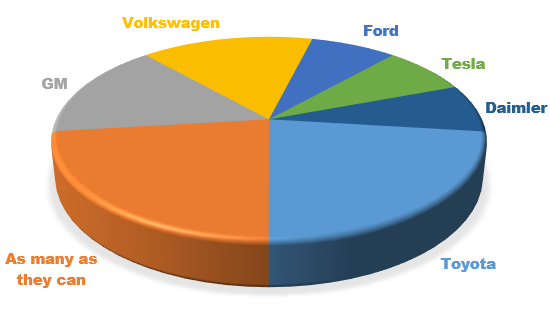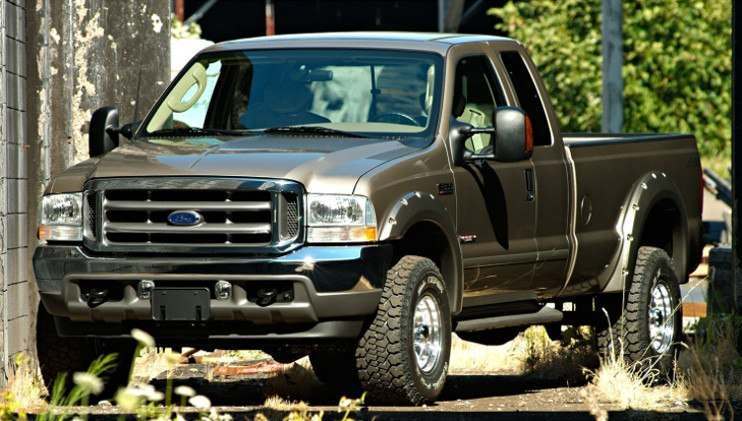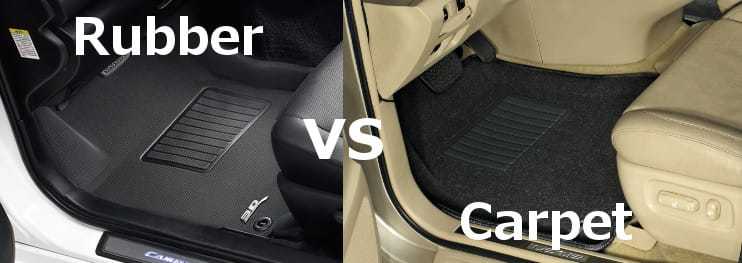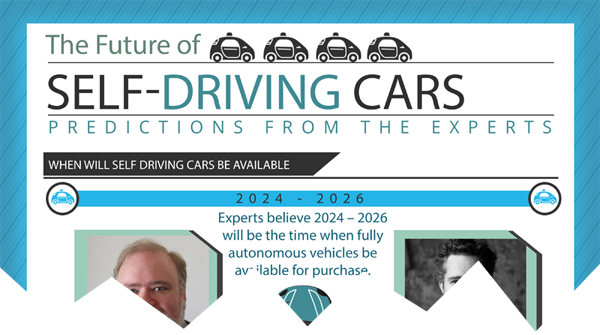
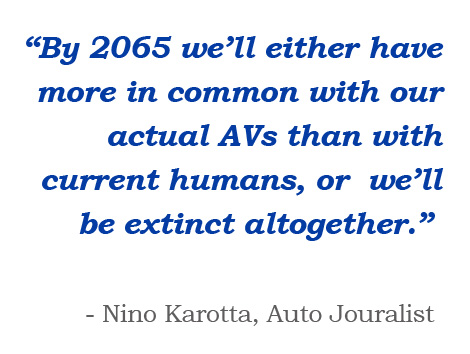
While you wait for self-driving cars, protect your floors in your current vehicle with WeatherTech Floor Mats.
March 16th, 2015 – The North American International Auto Show back in January was this year’s first major automotive expo that showcased the industry’s latest trend – Autonomous Vehicles. We’ve seen automakers introduce features such as Adaptive Cruise Control, Self- Parking, and Collision Detection into new vehicles over the past year. The next step is ultimately removing the driving responsibility from the driver but which automaker will successfully complete it first?
Recently, NASA announced they would be partnering with Nissan to build driverless vehicles. There has even been speculation between tech giant Apple and Tesla competing or possibly even collaborating on an AV project. Is our society ready for this life-altering change? PartCatalog asked leading experts within the automotive industry to find out. These prominent auto-journalists shared their thoughts on where the automotive and autonomous vehicle industry is heading.
Table of Contents
Who will be the first with a fully AV (autonomous vehicle)?
Most functional, safe, most in-demand AV?
Who would you like to see attempt to create an AV?
Who will not attempt to create an AV?
Who will Google partner with?
Autonomous Vehicle design?
Effects of AV on society?
AVs and road safety?
Would you personally feel safe in an AV?
Prediction date for first AV for sale?
Cost of fully Autonomous Vehicles?
Other thoughts, insights, concerns, predictions?
Charlie Turner Brad Templeton Rob Davidson Brian Cooley Carl Anthony Jeff Glucker Nino Karotta Steve Hammes Matt Farah John Voelcker
Editor in Chief of BBC TopGear Magazine
Twitter
RoboCars, Consultant: Google’s Self-Driving Car
Twitter
Auto Journalist for Wheels on Edge
Twitter
Editor at Large for CNET on Cars
Twitter
Detroit Editor for Automoblog.net
Facebook
Co-Founder/Exec. Ed. Hooniverse
Twitter
Auto Journalist featured on Jalopnik, DriftWorks,
TopSpeed
Twitter
Auto Critic for Test Drive Now
Twitter
Executive Producer and Host of The Smoking Tire
Twitter
Editor in Chief of Green Car Reports, Senior Editor at The Car Connection & Motor Authority
Twitter
 I don’t see any one manufacturer leading in this area, while Mercedes has made huge progress in AV’s, the VW group (with Audi) are also forging ahead and I believe that the majority of high end manufacturers will all have an AV strategy going forwards, lead primarily by the luxury manufacturers due to the cost implication that have to filter down to the end use.
I don’t see any one manufacturer leading in this area, while Mercedes has made huge progress in AV’s, the VW group (with Audi) are also forging ahead and I believe that the majority of high end manufacturers will all have an AV strategy going forwards, lead primarily by the luxury manufacturers due to the cost implication that have to filter down to the end use.
– Charlie Turner (TopGear)
 The Navia shipped in 2014, so it was first. Google will be next, but they’re not a car maker. The car makers keep saying they don’t want to make such a car. The most advanced companies at present are Daimler, BMW, Tesla, Audi/VW, Volvo, Nissan, Ford, Toyota in roughly that order, but that may not decide who releases first, which would probably be Tesla. The non-car projects in Singapore and the UK will also appear first, before any major car maker.
The Navia shipped in 2014, so it was first. Google will be next, but they’re not a car maker. The car makers keep saying they don’t want to make such a car. The most advanced companies at present are Daimler, BMW, Tesla, Audi/VW, Volvo, Nissan, Ford, Toyota in roughly that order, but that may not decide who releases first, which would probably be Tesla. The non-car projects in Singapore and the UK will also appear first, before any major car maker.
– Brad Templeton (Singularity University)
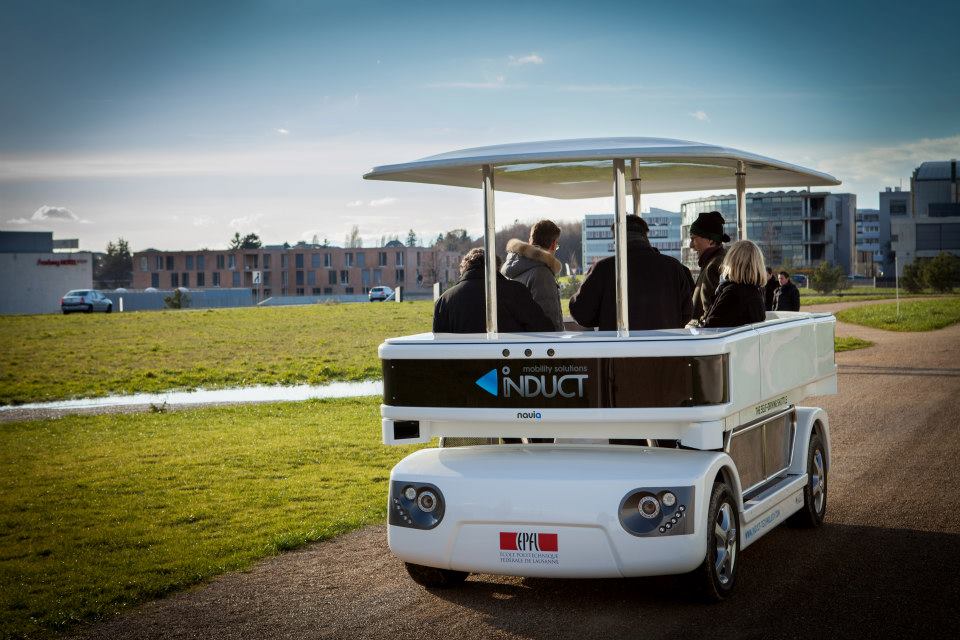
 This is a real crap shoot. Historically most technological innovations have come from High End car manufacturers. Until Toyota’s Prius. Now it seems everyone can have a hybrid in their lineup. Yes , Mercedes Benz products are offering hands free driving , but Hyundai’s can drive themselves for short distances too..
This is a real crap shoot. Historically most technological innovations have come from High End car manufacturers. Until Toyota’s Prius. Now it seems everyone can have a hybrid in their lineup. Yes , Mercedes Benz products are offering hands free driving , but Hyundai’s can drive themselves for short distances too..
Recently we’ve been hearing a lot about Apple and Google making their own car. Personally I don’t think this will happen. I believe they’ll partner up with a manufacturer like Audi or Mercedes or even Toyota. Last year Audi ran a self piloted 7 series around a couple of race tracks. A couple of years ago Volvo was making a lot of noise about its’ pedestrian avoidance programming. Self driving is just a hop skip and a jump from there.
Back in 2007 I went to the DARPA Grand Challenge event at Victorville Airport in the Mojave Desert. Fully autonomous cars turned loose in a real world-like neighbourhood. Only six out of the twenty-odd teams finished. The rest ended up looking like “bad parking” viral videos – cars going back and forth and getting no where.
Who? Honestly? No idea. But I couldn’t count out Toyota or Hyundai. BMW is too small. I haven’t seen a lot of original research coming from Mercedes. Maybe Audi.
– Rob Davidson (Wheels on Edge)
 Hard to say and the first mover advantage won’t be too meaningful as I don’t think any one carmaker is going to own the self-driving position in the market. This will be more like automatic transmissions, something that becomes the price of admission in the market and not a first mover advantage for long.
Hard to say and the first mover advantage won’t be too meaningful as I don’t think any one carmaker is going to own the self-driving position in the market. This will be more like automatic transmissions, something that becomes the price of admission in the market and not a first mover advantage for long.
– Brian Cooley (CNET on Cars)

Mercedes-Benz: Intelligent Drive is a fine example, with on board cameras to spot vehicles, objects and pedestrians. When any of those are detected, Intelligent Drive can activate 100% braking power and sound an alarm to warn the driver, helping to reduce the odds of a collision.
The central figure is the windshield planted stereo camera and radar that scans the landscape ahead in 3D. The camera has a range of 1,600 feet with a 45 degree spread while the radar features two different views: a 100 ft. range, left to right and a 200 ft. range to the rear. All the data those components internalize puts the car on high alert at all times. Consider Intelligent Drive like eyes and ears.
Mercedes-Benz attempts not to just react but rather predict.
– Carl Anthony (Automoblog.net)

Tesla. Because I think they’ll rush to put one on the market just for the PR value of being first.
– Gerry Malloy (Autofile)

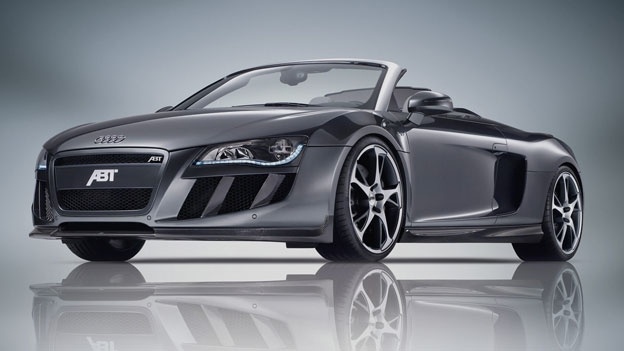
I think it’s going to be Audi. They’re pushing hard in that space, and recently had an A7 drive from San Francisco to Las Vegas pretty much on its own.
– Jeff Glucker (Hooniverse)
 Tesla. They have the car-building experience, the need of exposure, the brainz and, mainly, the balls.
Tesla. They have the car-building experience, the need of exposure, the brainz and, mainly, the balls.
– Nino Karotta (Auto Journalist)
 I believe it’ll be a non-traditional car company…perhaps a Google or similar. At the same time, I don’t necessarily believe that being ‘first’ is going to be all that critical. Consumer trust in the product will be a key.
I believe it’ll be a non-traditional car company…perhaps a Google or similar. At the same time, I don’t necessarily believe that being ‘first’ is going to be all that critical. Consumer trust in the product will be a key.
– Steve Hammes (Test Drive Now)

Mercedes and Tesla have come the closest so far. So I’d imagine that if we get to a point where the Government starts allowing privately owned AV’s, those two will be ready.
– Matt Farah (The Smoking Tire)
 Hah! This is a tough one! See, Toyota and Honda likely have the capability to make it happen. However, nowadays they play everything safe. There’s a chance they’ll wait until someone else becomes the guinea pig and then they’ll jump in and make their own when they know there’s a market and they can make money off it. Chevrolet might be it. They seem to take the biggest risks on some of the craziest ideas (and therefore end up losing a lot of money). That said, even amongst all the recalls, they seem to pull off progressive things such as the Chevy Volt.
Hah! This is a tough one! See, Toyota and Honda likely have the capability to make it happen. However, nowadays they play everything safe. There’s a chance they’ll wait until someone else becomes the guinea pig and then they’ll jump in and make their own when they know there’s a market and they can make money off it. Chevrolet might be it. They seem to take the biggest risks on some of the craziest ideas (and therefore end up losing a lot of money). That said, even amongst all the recalls, they seem to pull off progressive things such as the Chevy Volt.
– Danny Cruz (RallyWays)
 Daimler, Nissan, GM, BMW – one of these most likely.
Daimler, Nissan, GM, BMW – one of these most likely.
Possibly Tesla, but they have has some bigger problems to solve right now, so I’m not sure full autonomy will be their main focus.
– John Voelcker (Green Car Reports)
 Bringing an autonomous vehicle to market isn’t about the vehicle itself; they already exist. What will determine the AV’s viability is infrastructure and legislation, along with the climate where they’re being sold, at least until engineers figure out how to overcome the difficulties associated with snow-covered roads and sensors. If an AV is going to come to market, I suspect it will first do so in Japan, and based on the experimental models I’ve seen, I think it might be Honda or Nissan.
Bringing an autonomous vehicle to market isn’t about the vehicle itself; they already exist. What will determine the AV’s viability is infrastructure and legislation, along with the climate where they’re being sold, at least until engineers figure out how to overcome the difficulties associated with snow-covered roads and sensors. If an AV is going to come to market, I suspect it will first do so in Japan, and based on the experimental models I’ve seen, I think it might be Honda or Nissan.– Jil McIntosh (Woman on Wheels)
 As I outline above, I don’t see any one manufacturer dominating this space. It
As I outline above, I don’t see any one manufacturer dominating this space. It
will be a key part of the ongoing product strategy of leading manufactures and due to the nature of our business I would imaging the first fully functioning AV’s will come to market within a similar timeframe.
– Charlie Turner (TopGear)
 Google, because they are so far ahead of everybody else at this time it’s not even a competition. However, the car makers may be able to develop more demand as they have experience with that, but they keep saying they don’t want to make such a car.
Google, because they are so far ahead of everybody else at this time it’s not even a competition. However, the car makers may be able to develop more demand as they have experience with that, but they keep saying they don’t want to make such a car.
After Google, Bosch, Delphi and Continental have pretty advanced projects.
– Brad Templeton (Singularity University)
 see question one.
see question one.
I can see Audi (with the backing of Volkswagen) getting involved early. They already have a reputation as technology early adopters. My money is on them.
– Rob Davidson (Wheels on Edge)
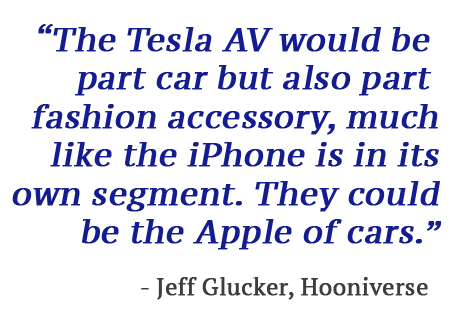
 Whoever does the best software and data and makes the best use of partners for mapping, road information, etc. That’s the differentiator in quality of AV experience as much or more than the sensors, electronics, etc.
Whoever does the best software and data and makes the best use of partners for mapping, road information, etc. That’s the differentiator in quality of AV experience as much or more than the sensors, electronics, etc.
– Brian Cooley (CNET on Cars)
 I am going with Mercedes-Benz here again, partly for the reasons listed above. The safest car in the world is a Mercedes-Benz and it stands to reason their AV vehicles would be too. They are the inventors of automobile safety: crumple zones, ABS, airbags, window bags, blind spot assist and the system of traction control as we know it. With that kind of legacy, it only stands to reason their AV’s would set the standard for safety in an entirely new class of automobile.
I am going with Mercedes-Benz here again, partly for the reasons listed above. The safest car in the world is a Mercedes-Benz and it stands to reason their AV vehicles would be too. They are the inventors of automobile safety: crumple zones, ABS, airbags, window bags, blind spot assist and the system of traction control as we know it. With that kind of legacy, it only stands to reason their AV’s would set the standard for safety in an entirely new class of automobile.
– Carl Anthony (Automoblog.net)
 Mercedes-Benz. Because they are already most of the way there and their history and approach will ensure that all the i’s are dotted and t’s crossed before putting it on the market.
Mercedes-Benz. Because they are already most of the way there and their history and approach will ensure that all the i’s are dotted and t’s crossed before putting it on the market.– Gerry Malloy (Autofile)
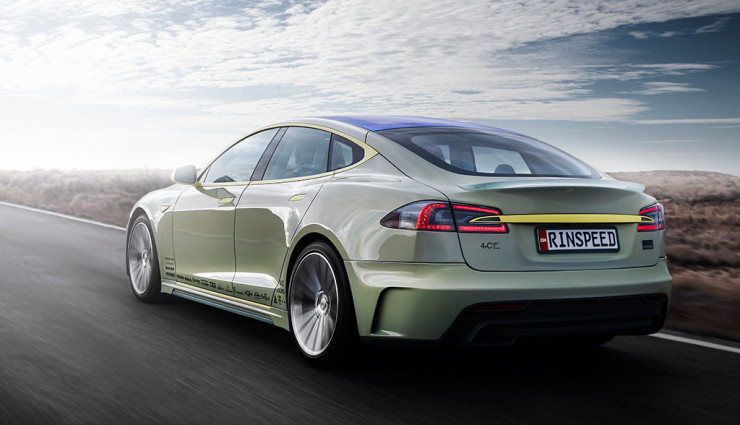
 Probably a company like Tesla. The Model S continues to impress people, and Elon Musk has big dreams for the future. Tesla is nearly there as it is, with some of the technology recently revealed when showing off the P85D.
Probably a company like Tesla. The Model S continues to impress people, and Elon Musk has big dreams for the future. Tesla is nearly there as it is, with some of the technology recently revealed when showing off the P85D.
The Tesla AV would be part car but also part fashion accessory, much like the iPhone is in its own segment. They could be the Apple of cars.
– Jeff Glucker (Hooniverse)
 I expect to see the first such vehicle to be born form a cooperation between a tech company and a car company. AV-s need real time data from as many sources as possible, and nobody has more of that than Google. As for who do they team up with for the hardware is not that crucial, but BMW comes to mind if they approach the market from the top end, or Toyota if otherwise.
I expect to see the first such vehicle to be born form a cooperation between a tech company and a car company. AV-s need real time data from as many sources as possible, and nobody has more of that than Google. As for who do they team up with for the hardware is not that crucial, but BMW comes to mind if they approach the market from the top end, or Toyota if otherwise.
– Nino Karotta (Auto Journalist)
 I question the premise that there will even be a demand.
I question the premise that there will even be a demand.– Steve Hammes (Test Drive Now)
 Mercedes. Because they have the resources, prestige, and already market top-tier cars to old, white people with money.
Mercedes. Because they have the resources, prestige, and already market top-tier cars to old, white people with money.– Matt Farah (The Smoking Tire)
 This goes directly after the first question. Toyota. Yup. Once they figure out there’s a viable market for it and someone else took the guinea pig plunge, Toyota will try and make their autonomous vehicle their new Prius. As much as many of us car enthusiasts don’t like the Prius, there’s no question that as a marketing piece and a brand, the Prius is the number one hybrid vehicle. Most likely, Toyota will try and replicate that with the new AV technology.
This goes directly after the first question. Toyota. Yup. Once they figure out there’s a viable market for it and someone else took the guinea pig plunge, Toyota will try and make their autonomous vehicle their new Prius. As much as many of us car enthusiasts don’t like the Prius, there’s no question that as a marketing piece and a brand, the Prius is the number one hybrid vehicle. Most likely, Toyota will try and replicate that with the new AV technology.
– Danny Cruz (RallyWays)
 Daimler – If the market wants these and the tech is proven in one brand, then most will end up very functional and safe. This stuff starts at the high end and filters down, to mass market cars (Hybrids were the exception to the rule). I expect this to be the case with autonomy, adding heavy duty computer processors and large array of sensors, etc. Once these failure-proof (multiply redundant) in-car systems are proven in one auto maker, everyone else will follow suit.
Daimler – If the market wants these and the tech is proven in one brand, then most will end up very functional and safe. This stuff starts at the high end and filters down, to mass market cars (Hybrids were the exception to the rule). I expect this to be the case with autonomy, adding heavy duty computer processors and large array of sensors, etc. Once these failure-proof (multiply redundant) in-car systems are proven in one auto maker, everyone else will follow suit.
By 2030, all of the largest auto makers will offer it along with other features that everyone wants.
– John Voelcker (Green Car Reports)
 I’m not completely convinced that there will be an in-demand AV, at least not in the near future. But if comes down to functions and safety, I think it may be either Honda or Mercedes-Benz.
I’m not completely convinced that there will be an in-demand AV, at least not in the near future. But if comes down to functions and safety, I think it may be either Honda or Mercedes-Benz.– Jil McIntosh (Woman on Wheels)

BMW’s i car strategy has been a breath of fresh air in automotive thinking and seeing that thinking applied to and AV or AV versions of the i cars would be a natural step forwards.
– Charlie Turner (TopGear)
 Apple would be interesting, though at present they are barely investigating it. Uber already sells the service but has the price of a driver.
Apple would be interesting, though at present they are barely investigating it. Uber already sells the service but has the price of a driver.
– Brad Templeton (Singularity University)
 I’d love to see Toyota hook up with Tesla. Yes , Tesla would probably be swallowed whole but maybe their sense of style would spill over into the boring Toyota asthetic. And I think both companies want the same thing – to be on the cutting edge of environmental cars.
I’d love to see Toyota hook up with Tesla. Yes , Tesla would probably be swallowed whole but maybe their sense of style would spill over into the boring Toyota asthetic. And I think both companies want the same thing – to be on the cutting edge of environmental cars.
– Rob Davidson (Wheels on Edge)
 I don’t have any preference here, to me it’s a broad industry and infrastructure trend. I care that all carmakers do AVs. Whoever you’d like to see doing an AV will be doing an AV, eventually.
I don’t have any preference here, to me it’s a broad industry and infrastructure trend. I care that all carmakers do AVs. Whoever you’d like to see doing an AV will be doing an AV, eventually.– Brian Cooley (CNET on Cars)
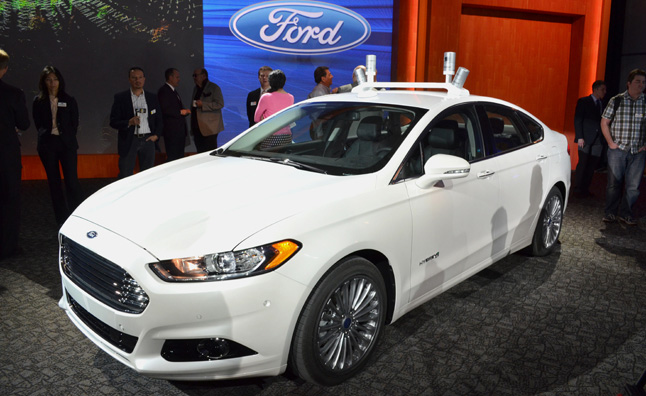
 Ford Motor Company and in particular, I would love to see it in the F-150. Things like Electric Power Assisted Steering, Active Nibble Control and the stronger aluminum are great driver allies for safety and comfort. Pair that with things like the High Strength Steel Frame and I think it would be cool to see Ford, especially in the F-150, expand into a truck that could possibly drive itself, trailer attached and all. Autonomous Trailer Sway Control? I like it!
Ford Motor Company and in particular, I would love to see it in the F-150. Things like Electric Power Assisted Steering, Active Nibble Control and the stronger aluminum are great driver allies for safety and comfort. Pair that with things like the High Strength Steel Frame and I think it would be cool to see Ford, especially in the F-150, expand into a truck that could possibly drive itself, trailer attached and all. Autonomous Trailer Sway Control? I like it!
– Carl Anthony (Automoblog.net)
 Mercedes-Benz, for the reason stated above.
Mercedes-Benz, for the reason stated above.
– Gerry Malloy (Autofile)
 I’m foolish, so I’d like to see a company create an AV that doesn’t need to be created. Like a Subaru rally AV or a Lamborghini AV that shows you the proper line for a race track.
I’m foolish, so I’d like to see a company create an AV that doesn’t need to be created. Like a Subaru rally AV or a Lamborghini AV that shows you the proper line for a race track.– Jeff Glucker (Hooniverse)
 Tesla, because they’ll spend some of the profit to try to save the world by safeguarding against an evil AI, and helping us to leave this sad, AV-ridden planet eventually on their rockets.
Tesla, because they’ll spend some of the profit to try to save the world by safeguarding against an evil AI, and helping us to leave this sad, AV-ridden planet eventually on their rockets.
Also Apple, because the world would need automotive products as well-rounded as Apple stuff usually is. But I’m rather sure they won’t be entering the automotive market before the age of the AV anyway. I mean not with hardware.
– Nino Karotta (Auto Journalist)
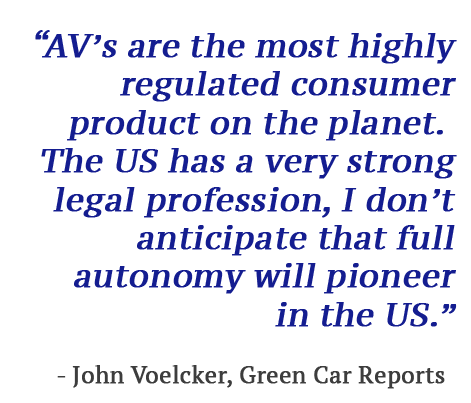
 I have no preference, but I suspect it’ll be a Tesla/Google or some company whose name we’ve yet to know.
I have no preference, but I suspect it’ll be a Tesla/Google or some company whose name we’ve yet to know.
– Steve Hammes (Test Drive Now)
 Ferrari. Because it would make Enzo roll in his grave and there’s nothing more fun to an American car enthusiast than that.
Ferrari. Because it would make Enzo roll in his grave and there’s nothing more fun to an American car enthusiast than that.
– Matt Farah (The Smoking Tire)
 Again Toyota. I’m no fanboy or anything, but if anybody can take new tech like this and make it right it would have to be Toyota. If not Toyota, I’d like to see BMW pull it off. They seem quite progressive lately with all their crazy new electric vehicles. Might as well jump into the AV bandwagon, right?
Again Toyota. I’m no fanboy or anything, but if anybody can take new tech like this and make it right it would have to be Toyota. If not Toyota, I’d like to see BMW pull it off. They seem quite progressive lately with all their crazy new electric vehicles. Might as well jump into the AV bandwagon, right?
– Danny Cruz (RallyWays)
 Mercedes. And, those makers that are known for their safety work – Daimler, Volvo, maybe someone like Subaru. The big makers, GM, Ford, Fiat, Chrysler, Germans, will all be working on all of this.
Mercedes. And, those makers that are known for their safety work – Daimler, Volvo, maybe someone like Subaru. The big makers, GM, Ford, Fiat, Chrysler, Germans, will all be working on all of this.
One thing that most people don’t appreciate about Silicon Valley is that most innovations fail. Think of a startup company as a romance: A person with money (the investor) meets a person with an idea (the inventor) and they fall in love, get married, and have a baby (the startup). Most people don’t understand that 5 to 7 of every 10 babies are slaughtered during childhood, and 1 or 2 more also die after their organs are harvested to give to better, brighter, more promising babies. Only one or two survive and grow into adulthood. One is a superstar, living the life of luxury, and then one is sort of normal, in a normal house, living a normal life.
Failure is a natural state of business in the inventions world. I would never have thought of working with someone who hadn’t failed. What you learn in dealing with failure is equally important dealing w/ success.
But, you can’t fail in the auto world. If your product fails, you kill people. Automobiles are the most highly regulated consumer product on the planet. The US has a very strong legal profession, I don’t anticipate that full autonomy will pioneer in the US.
Prediction – Some of the early semi autonomous technologies in cars pioneered in Japan, and tested there first. China might be a great place where this gets originally tested. Possibly Europe.
– John Voelcker (Green Car Reports)
 I’d rather not see anyone attempt it, because I don’t believe this is the future of transportation. That said, I would like to see Subaru get involved solely because the technology it’s using for collision avoidance systems is among the most affordable right now.
I’d rather not see anyone attempt it, because I don’t believe this is the future of transportation. That said, I would like to see Subaru get involved solely because the technology it’s using for collision avoidance systems is among the most affordable right now.– Jil McIntosh (Woman on Wheels)
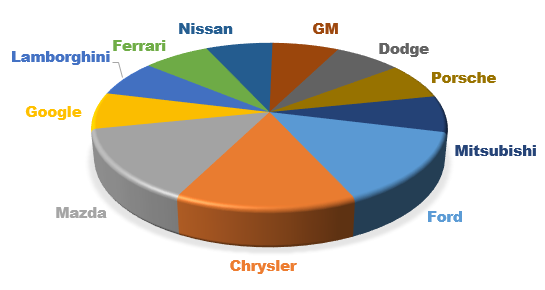
 Ferrari, Lamborghini, and other performance brands won’t enter this market obviously unless legislation dictates.
Ferrari, Lamborghini, and other performance brands won’t enter this market obviously unless legislation dictates.
– Charlie Turner (TopGear)
 The Koreans have announced nothing. Chinese makers do not make high quality cars yet. Chrysler/Dodge actually ran ads opposing the idea. Pure sportscar makers won’t.
The Koreans have announced nothing. Chinese makers do not make high quality cars yet. Chrysler/Dodge actually ran ads opposing the idea. Pure sportscar makers won’t.
– Brad Templeton (Singularity University)
 I don’t see any large North American manufacturers succeeding here. Which is a shame – so many of the historic advances in automotive technology came from US manufacturers. Not any more.
I don’t see any large North American manufacturers succeeding here. Which is a shame – so many of the historic advances in automotive technology came from US manufacturers. Not any more.– Rob Davidson (Wheels on Edge)
 The very low cost carmakers, of course, and those who have bigger fish to fry like their current survival in the U.S. market, etc. But any carmaker without an AV in its line by 2025-2030 is going to look odd.
The very low cost carmakers, of course, and those who have bigger fish to fry like their current survival in the U.S. market, etc. But any carmaker without an AV in its line by 2025-2030 is going to look odd.– Brian Cooley (CNET on Cars)
 Nissan. To me, it just doesn’t seem like their thing. I am sure they have the technology and the engineering – not saying that by any means. Maybe I will be surprised here and if I am, that’s cool but for now, I just can’t see it.
Nissan. To me, it just doesn’t seem like their thing. I am sure they have the technology and the engineering – not saying that by any means. Maybe I will be surprised here and if I am, that’s cool but for now, I just can’t see it.– Carl Anthony (Automoblog.net)
 Google. Because they have no experience or expertise in automobiles and it’s too competitive a market to get into from scratch.
Google. Because they have no experience or expertise in automobiles and it’s too competitive a market to get into from scratch.– Gerry Malloy (Autofile)
 I see someone like Ford really holding back and waiting. Not just Ford really, but most automakers in that space that want to deliver the most bang for the buck. An AV doesn’t fit into that scheme just yet.
I see someone like Ford really holding back and waiting. Not just Ford really, but most automakers in that space that want to deliver the most bang for the buck. An AV doesn’t fit into that scheme just yet.
Still, I don’t think there’s any automaker that isn’t paying attention to the AV space.
– Jeff Glucker (Hooniverse)
 Small specialist makers, who are willing to cater for a tiny, eventually disappearing market. Some sports car companies, which will be regarded as exotic high-end toy manufacturers. Morgan, Pagani, the like.
Small specialist makers, who are willing to cater for a tiny, eventually disappearing market. Some sports car companies, which will be regarded as exotic high-end toy manufacturers. Morgan, Pagani, the like.– Nino Karotta (Auto Journalist)
 I can’t see sports car companies like Porsche being all too excited about the prospects.
I can’t see sports car companies like Porsche being all too excited about the prospects.– Steve Hammes (Test Drive Now)
 Mitsubishi; they won’t be making cars that long.
Mitsubishi; they won’t be making cars that long.– Matt Farah (The Smoking Tire)
 Mazda. At least not for the time being. I love Mazda. I love how niche they are. I love how small and dedicated their vehicle lineup is. By that same token you could say that Jeep, Maserati, Jaguar and Aston Martin will not be making autonomous vehicles. Well, Aston did market that creepy little Cignet thing, or whatever it’s called. Oh, and Fisker. Oh wait. Fisker is dead.
Mazda. At least not for the time being. I love Mazda. I love how niche they are. I love how small and dedicated their vehicle lineup is. By that same token you could say that Jeep, Maserati, Jaguar and Aston Martin will not be making autonomous vehicles. Well, Aston did market that creepy little Cignet thing, or whatever it’s called. Oh, and Fisker. Oh wait. Fisker is dead.– Danny Cruz (RallyWays)
 If it proves popular everyone will do it. Some makers will lag — the more struggling car makers, like Mazda. It’s not clear to me that Mazda has the financial capital to do its own research. And they’re more about “driving”, so it’s not really a fit within their culture. In 2030, assuming everyone else is doing it, everyone will have to be there.
If it proves popular everyone will do it. Some makers will lag — the more struggling car makers, like Mazda. It’s not clear to me that Mazda has the financial capital to do its own research. And they’re more about “driving”, so it’s not really a fit within their culture. In 2030, assuming everyone else is doing it, everyone will have to be there.– John Voelcker (Green Car Reports)
 I don’t think it will come from manufacturers that essentially started in the North American market as suppliers to other automakers, such as Mitsubishi. I also don’t think this is something that the domestic manufacturers will tackle right away for consumer sales.
I don’t think it will come from manufacturers that essentially started in the North American market as suppliers to other automakers, such as Mitsubishi. I also don’t think this is something that the domestic manufacturers will tackle right away for consumer sales.– Jil McIntosh (Woman on Wheels)
 The fact that Google has “reached out” to GM, Ford, Toyota, Daimler and Volkswagen rather points to me earlier answer. I can’t see Google limiting themselves to one automotive partner when working in conjunction with many would be far more advantageous. In reality and AV will need to talk to other AV’s and stick to a mutually agreed set of rule and behaviours or there will be a very ugly fight for road superiority and parking spaces.
The fact that Google has “reached out” to GM, Ford, Toyota, Daimler and Volkswagen rather points to me earlier answer. I can’t see Google limiting themselves to one automotive partner when working in conjunction with many would be far more advantageous. In reality and AV will need to talk to other AV’s and stick to a mutually agreed set of rule and behaviours or there will be a very ugly fight for road superiority and parking spaces.
– Charlie Turner (TopGear)
 Google has said it has talked to every major car company. If they make a deal with any car company, it will be with the best combination of company quality and reputation, and how hungry the company is to deal with Google. The leading car company will want to do it on its own. The best car company that sees its own projects as too far behind will be most eager to partner.
Google has said it has talked to every major car company. If they make a deal with any car company, it will be with the best combination of company quality and reputation, and how hungry the company is to deal with Google. The leading car company will want to do it on its own. The best car company that sees its own projects as too far behind will be most eager to partner.
– Brad Templeton (Singularity University)
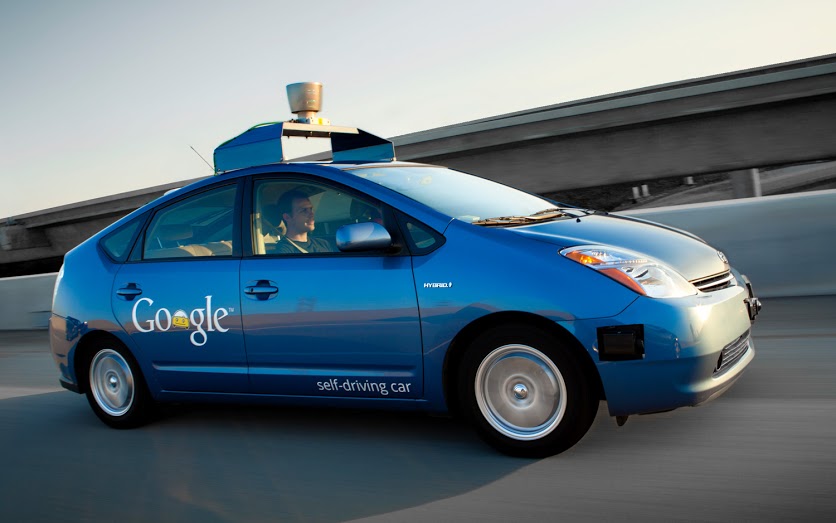
 Who will Google partner with? GM. Or Volks. It’ll have to be someone big. Here’s the wrestling match I’d love to see: Apple , Tesla and Toyota get together v/s Google and GM.
Who will Google partner with? GM. Or Volks. It’ll have to be someone big. Here’s the wrestling match I’d love to see: Apple , Tesla and Toyota get together v/s Google and GM.
– Rob Davidson (Wheels on Edge)
 That will come down to agility, flexibility and capital investment sharing, which isn’t my specialty. All these rumored partners build sophisticated cars at scale and at affordable price points. Each one is tied deeply into the global Tier 1 network, so they can all implement those attributes with Google’s software and data to get the job done. FWIW, Toyota and Ford have, at least publicly, been throwing some cold water on full AVs of late.
That will come down to agility, flexibility and capital investment sharing, which isn’t my specialty. All these rumored partners build sophisticated cars at scale and at affordable price points. Each one is tied deeply into the global Tier 1 network, so they can all implement those attributes with Google’s software and data to get the job done. FWIW, Toyota and Ford have, at least publicly, been throwing some cold water on full AVs of late.
– Brian Cooley (CNET on Cars)
 I could see Ford pulling this one off actually. They seem to be in the best position to attempt something like that. I look at how they partnered with Microsoft for Sync, which was a game changer. In my opinion, there is not a phone paring feature in the automotive market better than Sync. Basing it on their partnering with Microsoft for Sync, I could envision a successful run with Google for an autonomous vehicle.
I could see Ford pulling this one off actually. They seem to be in the best position to attempt something like that. I look at how they partnered with Microsoft for Sync, which was a game changer. In my opinion, there is not a phone paring feature in the automotive market better than Sync. Basing it on their partnering with Microsoft for Sync, I could envision a successful run with Google for an autonomous vehicle.
Then again, Mercedes-Benz is working with Google to find ways to improve navigation with Google Class. Perhaps that is a gateway to an AV?
– Carl Anthony (Automoblog.net)
 One of the lower volume manufacturers that doesn’t have the R&D budget or capability to do it on their own. For that reason.
One of the lower volume manufacturers that doesn’t have the R&D budget or capability to do it on their own. For that reason.– Gerry Malloy (Autofile)
 That’s a tough one to predict… I could see it happening with Toyota or Volkswagen, but I don’t know enough about those specific discussions to see what makes the most sense for Google.
That’s a tough one to predict… I could see it happening with Toyota or Volkswagen, but I don’t know enough about those specific discussions to see what makes the most sense for Google.– Jeff Glucker (Hooniverse)
 Doesn’t really matter. For Google, car companies are like phone hardware manufacturers. The next Nexus will be built by whoever seems to be the best business partner. And Google will want to be in _every_ AV’s brain, so it only makes sense to go the Android way, and have everybody license their software and traffic control infrastructure. They only need a partner to help the development process, the legislative hassle and to have a product that can spearhead the new genre. But Google will not pledge long-term allegiance to any manufacturer.
Doesn’t really matter. For Google, car companies are like phone hardware manufacturers. The next Nexus will be built by whoever seems to be the best business partner. And Google will want to be in _every_ AV’s brain, so it only makes sense to go the Android way, and have everybody license their software and traffic control infrastructure. They only need a partner to help the development process, the legislative hassle and to have a product that can spearhead the new genre. But Google will not pledge long-term allegiance to any manufacturer.– Nino Karotta (Auto Journalist)
 Tesla
Tesla– Steve Hammes (Test Drive Now)
 Google would be silly not to partner with as many OEM’s as possible. Anyone who’s currently incorporating Android into their multimedia systems will probably be at the top of the list.
Google would be silly not to partner with as many OEM’s as possible. Anyone who’s currently incorporating Android into their multimedia systems will probably be at the top of the list.– Matt Farah (The Smoking Tire)
 That would have to GM and Toyota. GM and Toyota fit perfectly was the technology as mentioned in the comments above. Ford… I don’t know. Don’t know what it is, but I don’t think they’d be jumping into the project. Maybe I’ll be proven wrong. Volkswagen certainly has the the size and budget and technology to partner with Google for such a project. Hard to say, but I still stick with GM and Toyota.
That would have to GM and Toyota. GM and Toyota fit perfectly was the technology as mentioned in the comments above. Ford… I don’t know. Don’t know what it is, but I don’t think they’d be jumping into the project. Maybe I’ll be proven wrong. Volkswagen certainly has the the size and budget and technology to partner with Google for such a project. Hard to say, but I still stick with GM and Toyota.– Danny Cruz (RallyWays)
 Google is more likely to provide the under-structure, rather than actually offering a Google branded car. Google has been notably unsuccessful selling consumer brand products. Selling cars online was clearly going to be the next big thing, and it didn’t work out for Silicon Valley.
Google is more likely to provide the under-structure, rather than actually offering a Google branded car. Google has been notably unsuccessful selling consumer brand products. Selling cars online was clearly going to be the next big thing, and it didn’t work out for Silicon Valley.
That said, what car manufacturer wants to turn over its tech to Google? I think these car makers are not going to hand over all this tech to 3rd parties. They might license bits and pieces like nav systems. They might not want to give someone like Google this kind of power.
– John Voelcker (Green Car Reports)
 I would suspect Toyota if only because it’s immediately identifiable to a large number of American buyers as the top-selling sedan and for its perceived reliability. Daimler is too pricey and Volkswagen lacks the dealer network and name-brand recognition.
I would suspect Toyota if only because it’s immediately identifiable to a large number of American buyers as the top-selling sedan and for its perceived reliability. Daimler is too pricey and Volkswagen lacks the dealer network and name-brand recognition.– Jil McIntosh (Woman on Wheels)
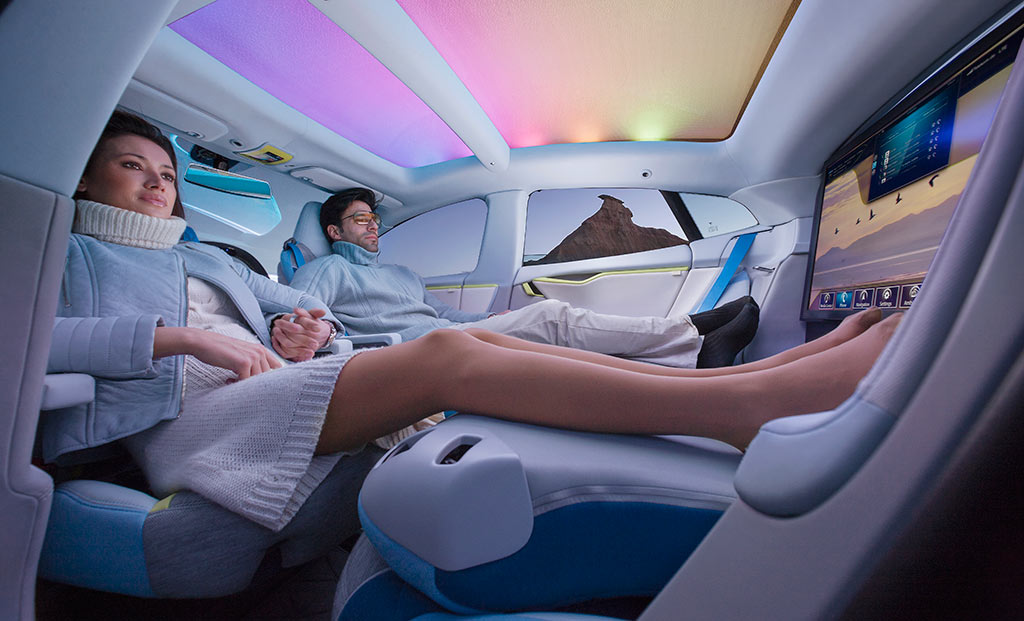
 The flexibility of the packaging of an AV (depending on powertrain) allows for greater freedom of design of the interior and exterior. My question would be, do all AV’s need to look like futuristic pods, do they need to scream “look at me Im futuristic”. Surely AV’s still need to be desirable and after generations of stunning automotive creations that tug at the buyers heartstrings, I hope the future of design still aims to deliver desirable aesthetics.
The flexibility of the packaging of an AV (depending on powertrain) allows for greater freedom of design of the interior and exterior. My question would be, do all AV’s need to look like futuristic pods, do they need to scream “look at me Im futuristic”. Surely AV’s still need to be desirable and after generations of stunning automotive creations that tug at the buyers heartstrings, I hope the future of design still aims to deliver desirable aesthetics.
– Charlie Turner (TopGear)
 Dozens of different ways, since you don’t sell them to people, you sell rides. Small ones for one person, living rooms with face to face seating for groups. Minimal cargo space in units for non-tourists. (use cargo robots.) Fuel for the sort of trips taken – electric and natural gas, less gasoline.
Dozens of different ways, since you don’t sell them to people, you sell rides. Small ones for one person, living rooms with face to face seating for groups. Minimal cargo space in units for non-tourists. (use cargo robots.) Fuel for the sort of trips taken – electric and natural gas, less gasoline.
– Brad Templeton (Singularity University)
 Design? No idea. Why should it be substantially different?
Design? No idea. Why should it be substantially different?– Rob Davidson (Wheels on Edge)
 Three rules: 1.) Think always about what drivers will want to and should spend their time doing when they don’t have to drive, 2.) how does an AV integrate safely and effectively into a largely non-AV world and 3.) what does an AV do once it can drive itself? Self-driving is the means to a broader end. Think about connecting that ability to smart parking infra, school schedules, dynamic fuel price data, neighborhood car sharing, etc., not just the literal ability to negotiate the roadway.
Three rules: 1.) Think always about what drivers will want to and should spend their time doing when they don’t have to drive, 2.) how does an AV integrate safely and effectively into a largely non-AV world and 3.) what does an AV do once it can drive itself? Self-driving is the means to a broader end. Think about connecting that ability to smart parking infra, school schedules, dynamic fuel price data, neighborhood car sharing, etc., not just the literal ability to negotiate the roadway.– Brian Cooley (CNET on Cars)
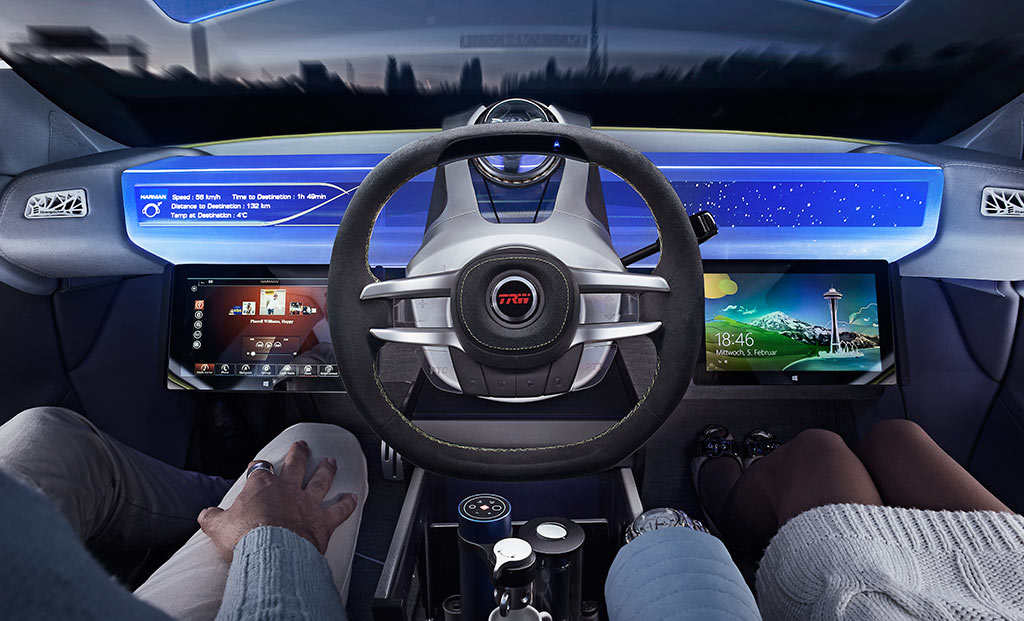
 I think it’s possible they will look really “futuristic” and almost ridiculous. You might see them at places like the North American International Auto Show and marvel at how “aerodynamic” and “sleek” they look.
I think it’s possible they will look really “futuristic” and almost ridiculous. You might see them at places like the North American International Auto Show and marvel at how “aerodynamic” and “sleek” they look.
An AV car seems like something from the future and as such, might look the part when it first arrives. I do envision a larger battery to run the required electrical systems, or a place in the vehicle for several batteries and alternators.
– Carl Anthony (Automoblog.net)
 More ‘spread-out’ space for occupants. Smaller exterior package to improve space efficiency,
More ‘spread-out’ space for occupants. Smaller exterior package to improve space efficiency,
– Gerry Malloy (Autofile)
 Yes, a large passenger space should be a major consideration. The fuel tank could indeed be smaller because the car should, theoretically, achieve optimum fuel economy.
Yes, a large passenger space should be a major consideration. The fuel tank could indeed be smaller because the car should, theoretically, achieve optimum fuel economy.– Jeff Glucker (Hooniverse)
 Mass production AV’s will not use internal combustion engines. We’ll see larger passenger space, geared towards work and recreational activities (laptop holders, even more cup holders, food storage, in-built trash bin). Even more advanced passanger restraint solutions, since accidents will continue to happen until AV’s and normal cars coexist. We’ll be having fully reclineable seats.
Mass production AV’s will not use internal combustion engines. We’ll see larger passenger space, geared towards work and recreational activities (laptop holders, even more cup holders, food storage, in-built trash bin). Even more advanced passanger restraint solutions, since accidents will continue to happen until AV’s and normal cars coexist. We’ll be having fully reclineable seats.– Nino Karotta (Auto Journalist)
 Depends on how much controller intervention is still required. The canvas is completely blank for fresh ideas.
Depends on how much controller intervention is still required. The canvas is completely blank for fresh ideas.– Steve Hammes (Test Drive Now)
 It should be very, very practical. These cars will not be fun, but they will change commuting forever. No roadsters, for instance.
It should be very, very practical. These cars will not be fun, but they will change commuting forever. No roadsters, for instance.– Matt Farah (The Smoking Tire)
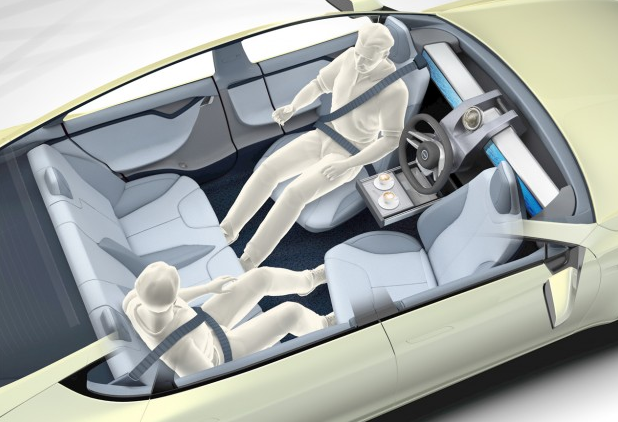
 I don’t know about a smaller fuel tank, but a larger passenger space would be a must. There would probably be a way for the passengers to stand up and change position, grab a snack and maybe lie down. If the AVs will be on the same roads as the usual idiots that drive on our roads, then don’t expect much changes from what a normal car is inside. But if the AVs will have their own roadways then the options are limitless.
I don’t know about a smaller fuel tank, but a larger passenger space would be a must. There would probably be a way for the passengers to stand up and change position, grab a snack and maybe lie down. If the AVs will be on the same roads as the usual idiots that drive on our roads, then don’t expect much changes from what a normal car is inside. But if the AVs will have their own roadways then the options are limitless.
– Danny Cruz (RallyWays)
 Assuming It will never have accidents… You can probably both lose the control setup (steering wheels, etc), in theory that means that you may not have to have long noses, which covers combustion engines and provides crash absorption. Might not need windows. However, I like to see where I’m going even if I’m driving in a taxi. I don’t want to stare into a television.
Assuming It will never have accidents… You can probably both lose the control setup (steering wheels, etc), in theory that means that you may not have to have long noses, which covers combustion engines and provides crash absorption. Might not need windows. However, I like to see where I’m going even if I’m driving in a taxi. I don’t want to stare into a television.
There could be sofa seating, where everybody faces each other. The Mercedes concept car had swivel from seats in the front to face the rear.
It’s also possible these are going to be much smaller and more purposeful, like transportation pods. Right now, we tend to want vehicles to do everything.
This would be like a 2-passenger “pod”, this would be much more efficient. We spend very little time with more than 1 or 2 people in a car. However, having both types of cars on the road at the same time will be very tough.
– John Voelcker (Green Car Reports)
 Passenger space is going to be the main draw, because if you’re not driving the vehicle, what else are you doing? There needs to be room to sit well back from the wheel to use one’s mobile device, or spin-around seats to face passengers in the rear. This is also an opportunity for electric cars, since they’ll be able to determine the best routes for their range.
Passenger space is going to be the main draw, because if you’re not driving the vehicle, what else are you doing? There needs to be room to sit well back from the wheel to use one’s mobile device, or spin-around seats to face passengers in the rear. This is also an opportunity for electric cars, since they’ll be able to determine the best routes for their range.– Jil McIntosh (Woman on Wheels)

 The legislation around AV’s and their integration into society’s road network will be hugely complex. There are obviously potentially huge advantages but the integration of AV’s into a road network still populated by cars from the last 4 decades limits the instant benefit.
The legislation around AV’s and their integration into society’s road network will be hugely complex. There are obviously potentially huge advantages but the integration of AV’s into a road network still populated by cars from the last 4 decades limits the instant benefit.
– Charlie Turner (TopGear)
 Increased road safety, reduced energy consumption, repurposing of parking lots to other uses, more congestion and then less congestion. Major redesign of cities and suburbs. Elimination of several classes of retailing. No more import of foreign oil.
Increased road safety, reduced energy consumption, repurposing of parking lots to other uses, more congestion and then less congestion. Major redesign of cities and suburbs. Elimination of several classes of retailing. No more import of foreign oil.
– Brad Templeton (Singularity University)
 Vast and transformative. Better roadway utilization, reduced congestion, reduced fuel consumption and exhaust emission, recapture of 1+ meaningful hours each day in hundreds of millions of peoples’ lives, hundreds of millions of new hours of interactive media usage daily, utter recasting of the cost and nature of auto insurance and, of course, dramatic reduction of injuries and fatalities toward the Zero Fatality goal in the EU by 2050.
Vast and transformative. Better roadway utilization, reduced congestion, reduced fuel consumption and exhaust emission, recapture of 1+ meaningful hours each day in hundreds of millions of peoples’ lives, hundreds of millions of new hours of interactive media usage daily, utter recasting of the cost and nature of auto insurance and, of course, dramatic reduction of injuries and fatalities toward the Zero Fatality goal in the EU by 2050.
– Brian Cooley (CNET on Cars)
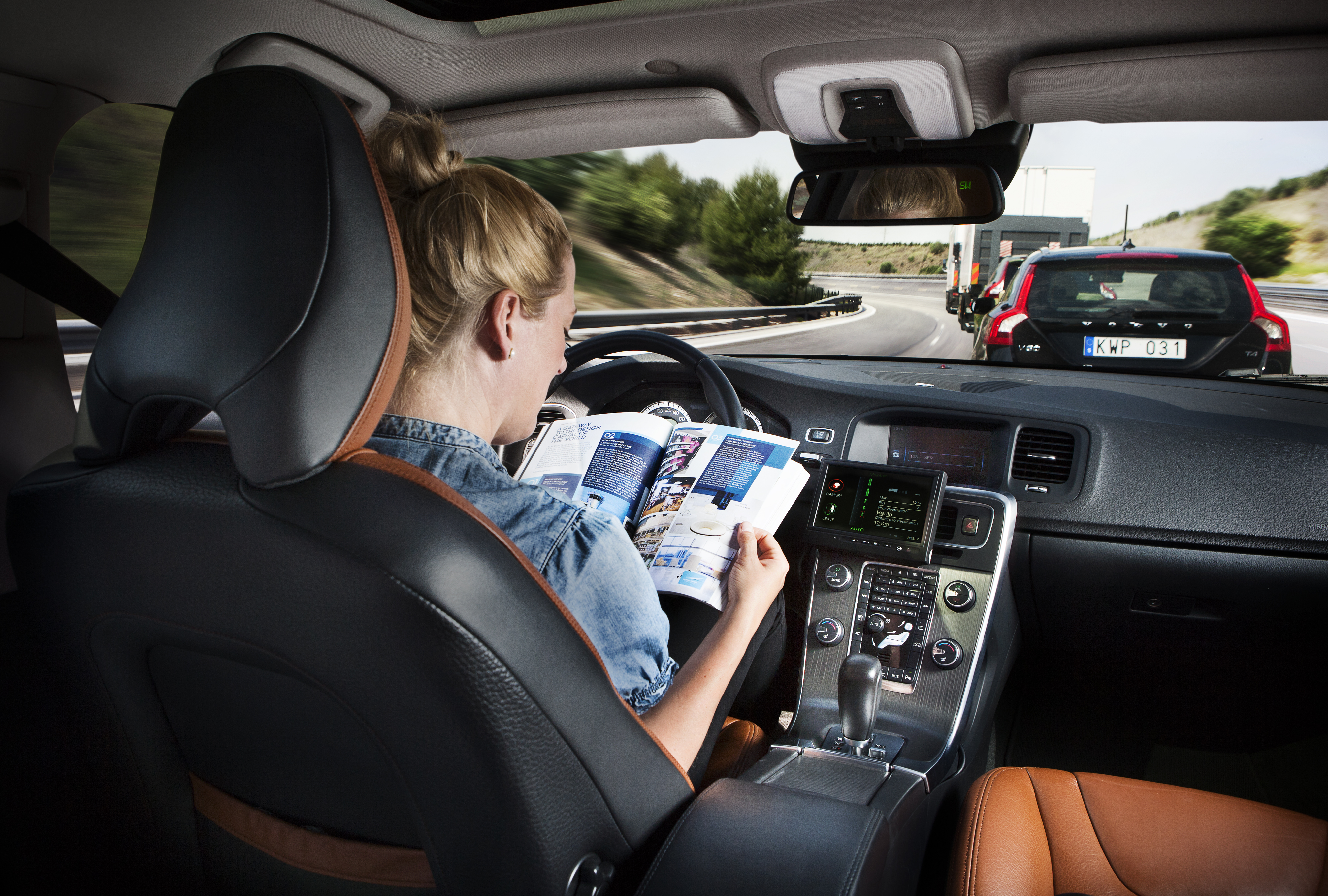
 I think of the movie Wall-E. In that story, the entire world was automated and it reduced the Earth to near nothingness. Now, would that be the occasional few AVs? No . . . but it could pave way for a drastically different future that we had best be ready to face the consequences of. If our entire society is automated, future generations may lose out on the practical applications of educating oneself in order to become better, more productive, upstanding etc. citizens.
I think of the movie Wall-E. In that story, the entire world was automated and it reduced the Earth to near nothingness. Now, would that be the occasional few AVs? No . . . but it could pave way for a drastically different future that we had best be ready to face the consequences of. If our entire society is automated, future generations may lose out on the practical applications of educating oneself in order to become better, more productive, upstanding etc. citizens.
– Carl Anthony (Automoblog.net)
 Initially it will complicate roadways and their use. Ultimately it has the potential to reduce congestion and improve safety.
Initially it will complicate roadways and their use. Ultimately it has the potential to reduce congestion and improve safety.
– Gerry Malloy (Autofile)
 As much as I love driving, I think AVs could make a lot of sense on the highways around urban areas. There’s too much congestion, and no one looks forward to their work commute. With an AV, the passengers could focus on their day ahead and not get worked up over the traffic in front of them.
As much as I love driving, I think AVs could make a lot of sense on the highways around urban areas. There’s too much congestion, and no one looks forward to their work commute. With an AV, the passengers could focus on their day ahead and not get worked up over the traffic in front of them.– Jeff Glucker (Hooniverse)
 Another chore will be taken care of by machines. Some tens of millions of people will have to find or learn something that they can do better than robots. Legislation and enforcement is killing out all fun from driving anyhow, so it only makes sense to let go of the temptation altogether. In-car sex, on the other hand, will be daily routine. For some couples, daily commute and love life might blend. Average sleep time might somewhat increase, along with the popularity of polycyclic sleeping patterns. Mobile game high scores will go up.
Another chore will be taken care of by machines. Some tens of millions of people will have to find or learn something that they can do better than robots. Legislation and enforcement is killing out all fun from driving anyhow, so it only makes sense to let go of the temptation altogether. In-car sex, on the other hand, will be daily routine. For some couples, daily commute and love life might blend. Average sleep time might somewhat increase, along with the popularity of polycyclic sleeping patterns. Mobile game high scores will go up.– Nino Karotta (Auto Journalist)
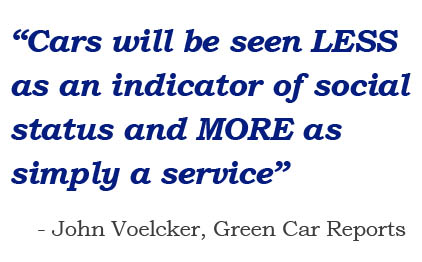
 I’d have to know more about the intermingling of the haves and have-nots. How many decades will it take to for AVs to become a majority? Will that ever happen? Driving enthusiasts will want nothing to do with them.
I’d have to know more about the intermingling of the haves and have-nots. How many decades will it take to for AVs to become a majority? Will that ever happen? Driving enthusiasts will want nothing to do with them.
– Steve Hammes (Test Drive Now)
 I think it will take 100 years before it makes a lick of difference to society as a whole. Right now, people are scared of automated machinery responsible for human lives, and that’s not likely to change.
I think it will take 100 years before it makes a lick of difference to society as a whole. Right now, people are scared of automated machinery responsible for human lives, and that’s not likely to change.
– Matt Farah (The Smoking Tire)
 It’s only a matter of time. I like the idea as it would allow drivers to drive because they like to; because they love to. So long as the right to drive is not lost. But sometimes when it comes to commuting, even people that love to drive hate their life when their stuck in a jam every morning. For those moments, even the most hard core drivers would enjoy taking a break from the bumper to bumper LA traffic and sit back and relax – maybe catch up on Game of Thrones or play GTA on their Playstations permanently fitted to their cars.
It’s only a matter of time. I like the idea as it would allow drivers to drive because they like to; because they love to. So long as the right to drive is not lost. But sometimes when it comes to commuting, even people that love to drive hate their life when their stuck in a jam every morning. For those moments, even the most hard core drivers would enjoy taking a break from the bumper to bumper LA traffic and sit back and relax – maybe catch up on Game of Thrones or play GTA on their Playstations permanently fitted to their cars.– Danny Cruz (RallyWays)
 I think it will increase the view that transportation is simply a service and these transportation pods are less about making a statement about who you are and how well you’re doing in society and more of a service. Cars are social status indicators. This may continue though — you may only want to get a high end AV with leather upholstery, etc.
I think it will increase the view that transportation is simply a service and these transportation pods are less about making a statement about who you are and how well you’re doing in society and more of a service. Cars are social status indicators. This may continue though — you may only want to get a high end AV with leather upholstery, etc.
How society buys and sells vehicles. Car sharing always makes car makers nervous.
– John Voelcker (Green Car Reports)
 I expect we’ll see vehicles becoming even more about connectivity, with automakers and infrastructure using big data to join everything together. For example, you’ll have your parking spot picked out and paid for before you even leave your driveway. This is possible now in some areas, but AVs are really only going to work and be truly viable when infrastructure works with them, including traffic lights and warning systems. Until then, they’re just reacting to other vehicles alongside them. The downside is that commerce and advertising will have new ways to make inroads with customers: your AV’s route could be programmed to take you not just the shortest way or the best way around traffic, but near the retailers that have partnered with your car’s manufacturer. Your pre-selected spot in the mall parking garage, for example, could be the closest one to the store chain that is involved with the automaker.
I expect we’ll see vehicles becoming even more about connectivity, with automakers and infrastructure using big data to join everything together. For example, you’ll have your parking spot picked out and paid for before you even leave your driveway. This is possible now in some areas, but AVs are really only going to work and be truly viable when infrastructure works with them, including traffic lights and warning systems. Until then, they’re just reacting to other vehicles alongside them. The downside is that commerce and advertising will have new ways to make inroads with customers: your AV’s route could be programmed to take you not just the shortest way or the best way around traffic, but near the retailers that have partnered with your car’s manufacturer. Your pre-selected spot in the mall parking garage, for example, could be the closest one to the store chain that is involved with the automaker.I also can see drive-yourself cars becoming the status symbol that sports cars are now. Just getting your vehicle to the grocery store by yourself could ultimately be as much about bragging rights as saying today that you’re trained to drive a car on a racetrack.
– Jil McIntosh (Woman on Wheels)
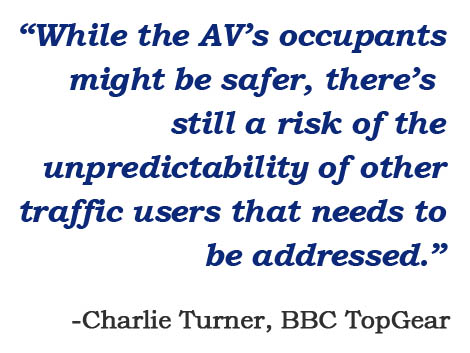
 As AV’s are integrated into a road network still populated by older “unpredictable” vehicles where the decisions are made by the driver the advantages of the AV are minimised and the complexity of the algorithms required to handle the unpredictability of other vehicles is huge.
As AV’s are integrated into a road network still populated by older “unpredictable” vehicles where the decisions are made by the driver the advantages of the AV are minimised and the complexity of the algorithms required to handle the unpredictability of other vehicles is huge.
So while the AV’s occupants might be safer, there’s still a risk of the unpredictability of other traffic users that needs to be addressed.
– Charlie Turner (TopGear)
 Safety will improve, almost by definition, because no company will put a vehicle in the hands of consumers until they have demonstrated improved safety to themselves, their lawyers, the public and maybe even (but hopefully not) the government.
Safety will improve, almost by definition, because no company will put a vehicle in the hands of consumers until they have demonstrated improved safety to themselves, their lawyers, the public and maybe even (but hopefully not) the government.
– Brad Templeton (Singularity University)
 Well , not everyone will be driving one so there will still be assholes on the roads. Which means there will still be crashes. Which means the AV cars will be bumper to bumper while I’m on my computer watching porn. Will AV cars have the ability to choose alternate routes? Probably.Eventually.
Well , not everyone will be driving one so there will still be assholes on the roads. Which means there will still be crashes. Which means the AV cars will be bumper to bumper while I’m on my computer watching porn. Will AV cars have the ability to choose alternate routes? Probably.Eventually.– Rob Davidson (Wheels on Edge)
 Vastly safer. Humans are good at fuzzy logic and unfamiliar pattern processing but poor at the vast majority of driving that lies outside of that. States like bored, distracted, drunk, tired and nervous come out of the equation, where they never should have been in the first place.
Vastly safer. Humans are good at fuzzy logic and unfamiliar pattern processing but poor at the vast majority of driving that lies outside of that. States like bored, distracted, drunk, tired and nervous come out of the equation, where they never should have been in the first place.– Brian Cooley (CNET on Cars)
 I think the infrastructure will have to change in order to accommodate them – or mass numbers of them. I think of the scenes in I, Robot for example. Technology now, like Adaptive Cruise Control, can adjust with the flow of traffic but I think in order for AVs to be truly safe, the infrastructure will have to change accordingly. To me, an AV alongside a vast majority of non-AVs, there are too many unknown variables. Weather conditions, sudden lane changes from another driver or an intoxicated driver etc.
I think the infrastructure will have to change in order to accommodate them – or mass numbers of them. I think of the scenes in I, Robot for example. Technology now, like Adaptive Cruise Control, can adjust with the flow of traffic but I think in order for AVs to be truly safe, the infrastructure will have to change accordingly. To me, an AV alongside a vast majority of non-AVs, there are too many unknown variables. Weather conditions, sudden lane changes from another driver or an intoxicated driver etc.
While AVs may be capable of “driving,” can they account for all the unknown variables that when met, human instinct would take over to get you (and your family) to safety? I am sure engineers behind these cars are addressing all of this, yet I would be curious to see how an AV might respond in a situation where the driving dynamics are unpredictable – as if often the case when any one of us gets behind the wheel, even for a short drive to the grocery store.
When the infrastructure: roads, interstates, bridges etc. change to accommodate the true AV car, only then will there be that total confidence, from the consumer, on safety. This is another area where Mercedes-Benz looks promising with their Intelligent Connect system; cars talking to cars, talking to traffic lights, homes, building etc.
– Carl Anthony (Automoblog.net)
 Ultimately will improve safety but probably not in the early years until protocols for interaction with conventional vehicles are worked out.
Ultimately will improve safety but probably not in the early years until protocols for interaction with conventional vehicles are worked out.– Gerry Malloy (Autofile)
 A computer is smarter than a human and can react more quickly. I imagine road safety would improve.
A computer is smarter than a human and can react more quickly. I imagine road safety would improve.– Jeff Glucker (Hooniverse)
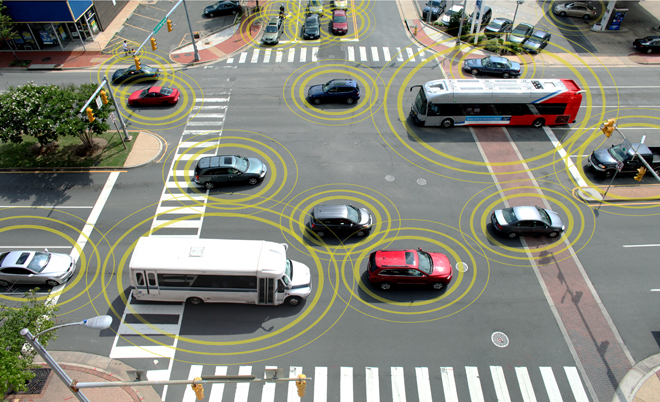
 I’m confident that incidents and fatalities will steadily decline. Machines – especially interconnected machines — are really much better suited to driving. And, eventually, to everything else as well.
I’m confident that incidents and fatalities will steadily decline. Machines – especially interconnected machines — are really much better suited to driving. And, eventually, to everything else as well.
– Nino Karotta (Auto Journalist)
 As Styx famously said in Mr. Roboto:
As Styx famously said in Mr. Roboto:
“The problem’s plain to see
Too much technology
Machines to save our lives
Machines dehumanize”
– Steve Hammes (Test Drive Now)
 I think the AV’s will cause fewer crashes than an equivalent number of human-driven cars. But they will cause more road rage because from what I hear, they drive like 90 year old grandmothers.
I think the AV’s will cause fewer crashes than an equivalent number of human-driven cars. But they will cause more road rage because from what I hear, they drive like 90 year old grandmothers.
– Matt Farah (The Smoking Tire)
 As long as someone other than Apple designs the software everything should be fine. No really, my last 2 iPhones have sucked. The hardware is good, but any update to the firmware and it turns the phone into a brick. Imagine if that happened to an autonomous vehicle? By the way, I’m typing this on a Mac. Lol. But in all seriousness, I think that a lot of testing will be needed to work out the bugs. Most of our cars these days have more computing power than Apollo 13. It’s just a matter of building up the tech to the point where it becomes safe and in turn makes roads safer.
As long as someone other than Apple designs the software everything should be fine. No really, my last 2 iPhones have sucked. The hardware is good, but any update to the firmware and it turns the phone into a brick. Imagine if that happened to an autonomous vehicle? By the way, I’m typing this on a Mac. Lol. But in all seriousness, I think that a lot of testing will be needed to work out the bugs. Most of our cars these days have more computing power than Apollo 13. It’s just a matter of building up the tech to the point where it becomes safe and in turn makes roads safer.– Danny Cruz (RallyWays)
 AV will react far faster than our hard wired reaction times as humans. Assuming they have thorough input data about how they communicate with each other and what they actually see. Once AV have all of this, they’ll be able to sense much quicker and in groups like fish, to externalities that humans cant.
AV will react far faster than our hard wired reaction times as humans. Assuming they have thorough input data about how they communicate with each other and what they actually see. Once AV have all of this, they’ll be able to sense much quicker and in groups like fish, to externalities that humans cant.– John Voelcker (Green Car Reports)
 Ultimately I think it will get worse. No matter how sophisticated AVs get, there will still be circumstances when people will need to take control of their vehicles, and they won’t know enough about driving to do so. We already see this when people are not sufficiently trained to handle icy conditions, and now they won’t be able to do so in dry weather.
Ultimately I think it will get worse. No matter how sophisticated AVs get, there will still be circumstances when people will need to take control of their vehicles, and they won’t know enough about driving to do so. We already see this when people are not sufficiently trained to handle icy conditions, and now they won’t be able to do so in dry weather.The other issue is that AVs ultimately depend on systems that can only be fine-tuned so much. A self-driving car knows that it has to start braking when it’s a certain distance away from another vehicle, but it doesn’t know how much tread is left on its tires, or if there’s a puddle up ahead. Too many people don’t properly maintain their vehicles when they’re the ones at the wheel, and I think that will get worse when they don’t have to put any thought into where they’re going.
– Jil McIntosh (Woman on Wheels)
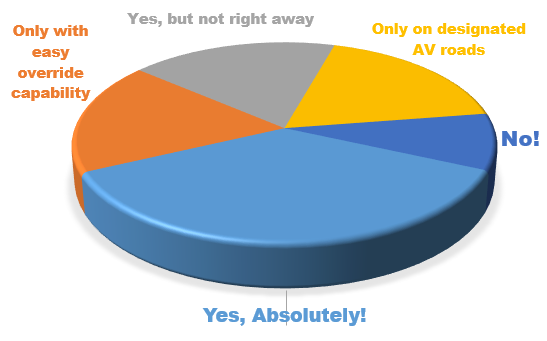
 Having spent decades driving I can see the benefits of AV’s in traffic congestion and in the long term future when they are in the majority, not to minority. I also look forward to being able to tell my AV when to come and pick me up. But no matter what the future, I will only ever feel safe in an AV that I can override at any given moment, control is still a major factor in the feeling of safety.
Having spent decades driving I can see the benefits of AV’s in traffic congestion and in the long term future when they are in the majority, not to minority. I also look forward to being able to tell my AV when to come and pick me up. But no matter what the future, I will only ever feel safe in an AV that I can override at any given moment, control is still a major factor in the feeling of safety.
– Charlie Turner (TopGear)
 If it has met those safety goals, yes. I have ridden in many, but they are still prototypes.
If it has met those safety goals, yes. I have ridden in many, but they are still prototypes.
– Brad Templeton (Singularity University)
 I feel safe when my wife is driving. Why wouldn’t I feel safe with an AV?
I feel safe when my wife is driving. Why wouldn’t I feel safe with an AV?
– Rob Davidson (Wheels on Edge)

 Generally, Yes. Computers operate under consistent rules within their own architecture as well as between units. That is the description of the perfect driver. Unfortunately, it doesn’t describe human drivers. Eric Schmidt was dead on when he said “It’s a bug that cars were invented before computers.” Of course, the software and sensors need to be pursued to a high state of polish, well above the typical standards demanded of a phone or a television.
Generally, Yes. Computers operate under consistent rules within their own architecture as well as between units. That is the description of the perfect driver. Unfortunately, it doesn’t describe human drivers. Eric Schmidt was dead on when he said “It’s a bug that cars were invented before computers.” Of course, the software and sensors need to be pursued to a high state of polish, well above the typical standards demanded of a phone or a television.
– Brian Cooley (CNET on Cars)
 Yes and No. I go with my above answer – to me, there are too many unknown variables when driving. Human instinct behind the wheel is invaluable. No computer or gadget can decipher and act like the human mind in a time of crisis. However, I think I would feel safer if I knew the roads were set up to handle an influx of AVs. To me, it would seem, with the correct infrastructure, the other AV’s would be aware of each other (hopefully) as to not run into one another.
Yes and No. I go with my above answer – to me, there are too many unknown variables when driving. Human instinct behind the wheel is invaluable. No computer or gadget can decipher and act like the human mind in a time of crisis. However, I think I would feel safer if I knew the roads were set up to handle an influx of AVs. To me, it would seem, with the correct infrastructure, the other AV’s would be aware of each other (hopefully) as to not run into one another.
One aspect of safety might be if a driver fell asleep. Certain systems on the market now will alert a person if it senses they are getting drowsy but taking this one step farther. If a person did fall asleep, AV technology could pull them to the side of the road and put on the hazard lights. AV cars might even be able to reduce road rage incidents too.
– Carl Anthony (Automoblog.net)
 Probably. Because by the time they come to market they’ll have to have so many redundant safety features they’ll be virtually crash-proof. My biggest concern is that a human driver instinctively acts in his/her best interest. An AV will probably have to be programmed for the greater good – i.e. – to save the greatest number of lives in a potential crash situation. Not a comforting thought for one alone in the vehicle if there is the potential for a crash involving multiple other vehicle occupants or pedestrians.
Probably. Because by the time they come to market they’ll have to have so many redundant safety features they’ll be virtually crash-proof. My biggest concern is that a human driver instinctively acts in his/her best interest. An AV will probably have to be programmed for the greater good – i.e. – to save the greatest number of lives in a potential crash situation. Not a comforting thought for one alone in the vehicle if there is the potential for a crash involving multiple other vehicle occupants or pedestrians.– Gerry Malloy (Autofile)
 Not the first generation, but down the road yes. Additionally, there’s NO WAY the safety folks are going to let an AV loose unless it’s supremely safe to ride in.
Not the first generation, but down the road yes. Additionally, there’s NO WAY the safety folks are going to let an AV loose unless it’s supremely safe to ride in.– Jeff Glucker (Hooniverse)
 Completely safe. Cars have been safer since computers design and robots build them. Airplanes have been safer since robots fly them. There are rare incidences where the ingenuity or unique instinct of a human can outperform a machine, but for computers, an evolutionary stage is some months long, for humans, tens of thousands of years.
Completely safe. Cars have been safer since computers design and robots build them. Airplanes have been safer since robots fly them. There are rare incidences where the ingenuity or unique instinct of a human can outperform a machine, but for computers, an evolutionary stage is some months long, for humans, tens of thousands of years.– Nino Karotta (Auto Journalist)
 This technology is SO FAR away that I’ll be 6’ under before I’ll ever need to decide. What you need to realize is that honing the vehicle technology is only a small part of the AV adoption question. Infrastructure and the decades of legal battles that’ll certainly follow will keep any serious presence of AVs in the marketplace at least 50 years away if not more.
This technology is SO FAR away that I’ll be 6’ under before I’ll ever need to decide. What you need to realize is that honing the vehicle technology is only a small part of the AV adoption question. Infrastructure and the decades of legal battles that’ll certainly follow will keep any serious presence of AVs in the marketplace at least 50 years away if not more.– Steve Hammes (Test Drive Now)
 I’ve driven in an AV before on a race track and I did feel safe. On the streets, I would need a VERY obvious “human override” button.
I’ve driven in an AV before on a race track and I did feel safe. On the streets, I would need a VERY obvious “human override” button.– Matt Farah (The Smoking Tire)
 The only way I would feel safe in an AV would be if all the bugs have been worked out and the AV travels on roads with ONLY AVs. Add texting drivers to the equations and being inside an AV would probably be worse than a regular vehicle.
The only way I would feel safe in an AV would be if all the bugs have been worked out and the AV travels on roads with ONLY AVs. Add texting drivers to the equations and being inside an AV would probably be worse than a regular vehicle.– Danny Cruz (RallyWays)
 Not the first runs, but after others have ridden in them, I’ll feel safe.
Not the first runs, but after others have ridden in them, I’ll feel safe.– John Voelcker (Green Car Reports)
 I don’t think I would. I’ve ridden in them in controlled conditions, but the real world is different. I understand that part of that is my own inability to relinquish control; I’m a better driver than I am a passenger. But there are hundreds of sensors in that vehicle processing millions of inputs every second, and they have to do it whether it’s freezing or broiling hot outside. Even with the fail-safes that these cars will have, I’m still not sure I want to be depending on all that at 60 mph.
I don’t think I would. I’ve ridden in them in controlled conditions, but the real world is different. I understand that part of that is my own inability to relinquish control; I’m a better driver than I am a passenger. But there are hundreds of sensors in that vehicle processing millions of inputs every second, and they have to do it whether it’s freezing or broiling hot outside. Even with the fail-safes that these cars will have, I’m still not sure I want to be depending on all that at 60 mph.– Jil McIntosh (Woman on Wheels)
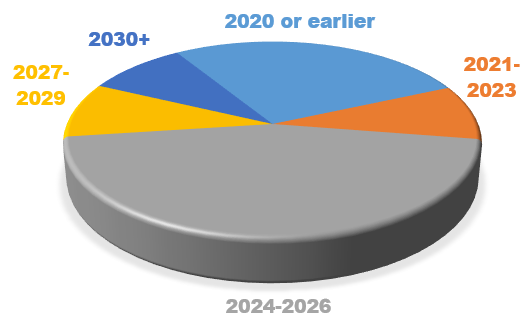
 The timings of the growth of the AV will greatly depend on the development of the legislation around their use, as such while they will become more greatly developed in the coming years. Their delivery into the mass market, will be governed by legislation and it will be fascinating to see which governments are most proactive in this area, not least in the developed/developing countries as they battle increased congestion.
The timings of the growth of the AV will greatly depend on the development of the legislation around their use, as such while they will become more greatly developed in the coming years. Their delivery into the mass market, will be governed by legislation and it will be fascinating to see which governments are most proactive in this area, not least in the developed/developing countries as they battle increased congestion.
– Charlie Turner (TopGear)
 Selling them probably happens well after people are able to order up rides in them so this question is less important. Services appear in limited areas in this decade, and expand in the 2020s. Cars for sale do happen, primarily in the early 2020s, becoming common later that decade.
Selling them probably happens well after people are able to order up rides in them so this question is less important. Services appear in limited areas in this decade, and expand in the 2020s. Cars for sale do happen, primarily in the early 2020s, becoming common later that decade.
– Brad Templeton (Singularity University)
 Well , back in 2007 I remember thinking we’ll likely never see one of these on the roads. Now I think within five years.
Well , back in 2007 I remember thinking we’ll likely never see one of these on the roads. Now I think within five years.– Rob Davidson (Wheels on Edge)
 Again, 2025 is shaping up to be that year, but I’m just going by automaker promises.
Again, 2025 is shaping up to be that year, but I’m just going by automaker promises.– Brian Cooley (CNET on Cars)
 Well the fully autonomous trip has already happened. Mercedes-Benz retraced Bertha Benz’s first drive in 1888, from Mannheim to Pforzheim, in August of 2013 with an S-Class. So the technology already exists and soon, the buyers will too. I give it ten years.
Well the fully autonomous trip has already happened. Mercedes-Benz retraced Bertha Benz’s first drive in 1888, from Mannheim to Pforzheim, in August of 2013 with an S-Class. So the technology already exists and soon, the buyers will too. I give it ten years.– Carl Anthony (Automoblog.net)
 Limited-production vehicles may be available for real world testing, as has been the case for fuel cell vehicles, by 2020, but likely five to ten years later for full commercial availability.
Limited-production vehicles may be available for real world testing, as has been the case for fuel cell vehicles, by 2020, but likely five to ten years later for full commercial availability.– Gerry Malloy (Autofile)
 I’d wager a guess that we’re 10-15 years away. We have a lot of things that need to be worked out still, from legislation and insurance to the actual technology.
I’d wager a guess that we’re 10-15 years away. We have a lot of things that need to be worked out still, from legislation and insurance to the actual technology.– Jeff Glucker (Hooniverse)
 I consider this to be more of a sociological and legislative issue than technological. I’d say technology will be ready (and by ready I mean all-weather, round-the clock ready) by the end of this decade. Large scale commercialization shall follow in another five years after that.
I consider this to be more of a sociological and legislative issue than technological. I’d say technology will be ready (and by ready I mean all-weather, round-the clock ready) by the end of this decade. Large scale commercialization shall follow in another five years after that.– Nino Karotta (Auto Journalist)
 That’s a tricky question and not that important. Just like hydrogen fuel-cell vehicles, they can be purchased now but only a handful of people have them. Someone will rush one to market just to scream “we were first” but it’ll simply be a marketing ploy.
That’s a tricky question and not that important. Just like hydrogen fuel-cell vehicles, they can be purchased now but only a handful of people have them. Someone will rush one to market just to scream “we were first” but it’ll simply be a marketing ploy.– Steve Hammes (Test Drive Now)
 30 years or more.
30 years or more.– Matt Farah (The Smoking Tire)
 I don’t think it would be at least for another 10 years. We might start seeing more and more prototypes and we might even see vehicles that would be good enough to able to be a production AV. However, I think the main problem is not the cars themselves, but rather the infrastucture that needs to support them… Our roads.
I don’t think it would be at least for another 10 years. We might start seeing more and more prototypes and we might even see vehicles that would be good enough to able to be a production AV. However, I think the main problem is not the cars themselves, but rather the infrastucture that needs to support them… Our roads.– Danny Cruz (RallyWays)
 2025, plus or minus 3 years where the route is previously known, where there are limited types of roads, when the weather is good.
2025, plus or minus 3 years where the route is previously known, where there are limited types of roads, when the weather is good.– John Voelcker (Green Car Reports)
 I can’t see these vehicles going on sale for at least 10 years and perhaps 15 to 20. If they come in before then, it’s going to be in areas with more moderate climates, such as California, because of the issues created by snow and ice.
I can’t see these vehicles going on sale for at least 10 years and perhaps 15 to 20. If they come in before then, it’s going to be in areas with more moderate climates, such as California, because of the issues created by snow and ice.– Jil McIntosh (Woman on Wheels)
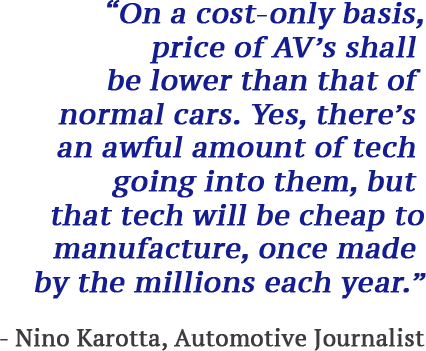
 As with all automotive new frontiers their cost will be governed by their numbers. Initially their appeal to the higher end market will drive higher end margins and prices, but as the technology becomes more prevalent and more readily available and they become more readily available at the middle end of the market then their cost based will reduce.
As with all automotive new frontiers their cost will be governed by their numbers. Initially their appeal to the higher end market will drive higher end margins and prices, but as the technology becomes more prevalent and more readily available and they become more readily available at the middle end of the market then their cost based will reduce.
– Charlie Turner (TopGear)
 Less than driving your own car, which costs about 50 to 60 cents/mile. The eventual ones for sale will probably cost around $5,000 more than similar vehicles. Well, they could cost that, but since they will be luxury vehicles, where you pay $3,000 for a simple “technology package” I expect the earlier ones will cost more like $15K extra, with about a $4,000 hardware cost.
Less than driving your own car, which costs about 50 to 60 cents/mile. The eventual ones for sale will probably cost around $5,000 more than similar vehicles. Well, they could cost that, but since they will be luxury vehicles, where you pay $3,000 for a simple “technology package” I expect the earlier ones will cost more like $15K extra, with about a $4,000 hardware cost.
– Brad Templeton (Singularity University)
 Depends how determined the manufacturer is to get consumer adoption. Toyota decided to take a bath on each Prius it sold. It probably still does. Manufacturers will charge as much as the market will bear. To within a penny.
Depends how determined the manufacturer is to get consumer adoption. Toyota decided to take a bath on each Prius it sold. It probably still does. Manufacturers will charge as much as the market will bear. To within a penny.
At first it’ll be luxury cars , but within a year or two it’ll trickle down. Within ten years AV will be as ubiquitous as automatic transmissions or four wheel drive.
– Rob Davidson (Wheels on Edge)
 A $5,000 -$10,000 premium seems roughly right at launch, but that depends largely on how carmakers choose to package it. A 2025 Hyundai Sonata might require a $5,000 option package, where a 2025 S Class might just be an AV as part of its market positioning. The real question is what the technology offering will cost carmakers per unit as well as in accumulated R&D. They earn back time on that is an unknown to me but important toward actual MSRP.
A $5,000 -$10,000 premium seems roughly right at launch, but that depends largely on how carmakers choose to package it. A 2025 Hyundai Sonata might require a $5,000 option package, where a 2025 S Class might just be an AV as part of its market positioning. The real question is what the technology offering will cost carmakers per unit as well as in accumulated R&D. They earn back time on that is an unknown to me but important toward actual MSRP.– Brian Cooley (CNET on Cars)
 A lot of money . . . at first . . . 100K maybe – but in time, the cost would come down. Manufacturing processes can and would become more streamlined to reduce costs. Once the AV is out for the masses, somebody will come along with a more efficient means of producing them and pass that savings onto the consumer. That is where I can see the Japanese really coming into play.
A lot of money . . . at first . . . 100K maybe – but in time, the cost would come down. Manufacturing processes can and would become more streamlined to reduce costs. Once the AV is out for the masses, somebody will come along with a more efficient means of producing them and pass that savings onto the consumer. That is where I can see the Japanese really coming into play.– Carl Anthony (Automoblog.net)
 Initially, $100k or more.
Initially, $100k or more.– Gerry Malloy (Autofile)
 I would imagine this technology would first roll out in the luxury space, so it won’t be cheap. Eventually, however, it will filter down to less expensive vehicles.
I would imagine this technology would first roll out in the luxury space, so it won’t be cheap. Eventually, however, it will filter down to less expensive vehicles.– Jeff Glucker (Hooniverse)
 On a cost-only basis, price of AV’s shall be lower than that of normal cars. Yes, there’s an awful amount of tech going into them, but that tech will be cheap to manufacture, once made by the millions each year. And electric cars are much less complicated than ICE automobiles. We need to have an energy storage revolution first, but that will happen duly before the age of the AV. All in all the first AVs will be expensive, but eventually AV’s will be cheaper (will amount to a smaller percentage of the average person’s income) than a normal car.
On a cost-only basis, price of AV’s shall be lower than that of normal cars. Yes, there’s an awful amount of tech going into them, but that tech will be cheap to manufacture, once made by the millions each year. And electric cars are much less complicated than ICE automobiles. We need to have an energy storage revolution first, but that will happen duly before the age of the AV. All in all the first AVs will be expensive, but eventually AV’s will be cheaper (will amount to a smaller percentage of the average person’s income) than a normal car.– Nino Karotta (Auto Journalist)
 1 milllllllionnnn dollars. No, I really have no idea.
1 milllllllionnnn dollars. No, I really have no idea.– Steve Hammes (Test Drive Now)
 Like anything else new, it will be obscenely expensive compared to a normal car and probably come with lots of government-funded cash on the hood.
Like anything else new, it will be obscenely expensive compared to a normal car and probably come with lots of government-funded cash on the hood.– Matt Farah (The Smoking Tire)
 Like any new tech, at first, they will be quite expensive and it would be impossible to justify the expense from an economic point of view. For this reason, it would likely be the wealthy that acquire them first. Eventually, the technology will trickle down where normal people would be able to afford it. This sort of contradicts the point of Toyota building the first ones – As Toyota would only make them if they can make them affordable. I say “sort of contradicts” because while the original Prius was certainly affordable enough where regular people could buy them, the point still stands that they were too expensive to make your money back in gas savings. Even a Toyota AV would be a little hard to justify economically at first.
Like any new tech, at first, they will be quite expensive and it would be impossible to justify the expense from an economic point of view. For this reason, it would likely be the wealthy that acquire them first. Eventually, the technology will trickle down where normal people would be able to afford it. This sort of contradicts the point of Toyota building the first ones – As Toyota would only make them if they can make them affordable. I say “sort of contradicts” because while the original Prius was certainly affordable enough where regular people could buy them, the point still stands that they were too expensive to make your money back in gas savings. Even a Toyota AV would be a little hard to justify economically at first.– Danny Cruz (RallyWays)
 For full AV compared to similar vehicles, probably wouldn’t be more than 30% uptick.
For full AV compared to similar vehicles, probably wouldn’t be more than 30% uptick.– John Voelcker (Green Car Reports)
 As with the original hybrids, AVs are going to require heavy subsidization and will be loss leaders for their manufacturers for some time. I would expect to see a premium of at least $5,000 to $7,500 above the price of a similarly-equipped vehicle that you have to drive yourself.
As with the original hybrids, AVs are going to require heavy subsidization and will be loss leaders for their manufacturers for some time. I would expect to see a premium of at least $5,000 to $7,500 above the price of a similarly-equipped vehicle that you have to drive yourself.– Jil McIntosh (Woman on Wheels)
 AV’s aren’t going to go away and the potential long term advantages are obvious. But the growth in their popularity must never remove the responsibility from the driver and I would sincerely hope that any and all AV’s in the future will always continue to allow the driver to override all systems and go for a drive unaided.
AV’s aren’t going to go away and the potential long term advantages are obvious. But the growth in their popularity must never remove the responsibility from the driver and I would sincerely hope that any and all AV’s in the future will always continue to allow the driver to override all systems and go for a drive unaided.
– Charlie Turner (TopGear)
 I loathe the commute back and forth from my farm to Toronto. I can’t wait until I don’t have to pay any attention to it any more. Can’t happen soon enough for me.
I loathe the commute back and forth from my farm to Toronto. I can’t wait until I don’t have to pay any attention to it any more. Can’t happen soon enough for me.– Rob Davidson (Wheels on Edge)
 I love cars and driving but will be happy to give up the 90% of my daily driving that is just a chore. The biggest hurdle to AV market acceptance is not the technology but the mind shift that has to come among buyers . 1.) Driving is a key part of the identity we get from the kind of car we drive. But driving a car and being driven by a car are perhaps not equivalent in terms of image. 2.) Trust must be managed by all entrants into this market. The first one to screw it up with a big-headline disaster thanks to them rushing a half-baked AV to market will set the entire industry back due to the shaking of public trust. Just as with the beginning of air transportation, we need to carefully manage that first decade or so when people are learning to trusting a technology that seems to do magic.
I love cars and driving but will be happy to give up the 90% of my daily driving that is just a chore. The biggest hurdle to AV market acceptance is not the technology but the mind shift that has to come among buyers . 1.) Driving is a key part of the identity we get from the kind of car we drive. But driving a car and being driven by a car are perhaps not equivalent in terms of image. 2.) Trust must be managed by all entrants into this market. The first one to screw it up with a big-headline disaster thanks to them rushing a half-baked AV to market will set the entire industry back due to the shaking of public trust. Just as with the beginning of air transportation, we need to carefully manage that first decade or so when people are learning to trusting a technology that seems to do magic.– Brian Cooley (CNET on Cars)
 Just because we can do something doesn’t always mean we should. Would an AV car be nice? Yes. It might be nice to, after a long day at work, punch in your home address and take a nap while the car does all the driving. Yet, it may take away a sense of responsibility – when we drive, we must be diligent and mindful of the world around us. We can, I believe, automate ourselves so far into convenience we forget what it is like to be human.
Just because we can do something doesn’t always mean we should. Would an AV car be nice? Yes. It might be nice to, after a long day at work, punch in your home address and take a nap while the car does all the driving. Yet, it may take away a sense of responsibility – when we drive, we must be diligent and mindful of the world around us. We can, I believe, automate ourselves so far into convenience we forget what it is like to be human.
And there is the fun of driving. I’m a car guy and so the idea of an autonomous vehicle is very cool. I am an advocate for my home of Detroit so if production of one creates jobs, then I can get behind it. Maybe give me the option to turn that feature off? That way, when I want to feel the thrill of driving, I can. When I want to escape down the road with my car and hear the engine roar, I can.
– Carl Anthony (Automoblog.net)
 Liability issues, not technology, will be the factor determining when AVs will become publicly available.
Liability issues, not technology, will be the factor determining when AVs will become publicly available.– Gerry Malloy (Autofile)
 It’s inevitable.
It’s inevitable.– Jeff Glucker (Hooniverse)
 I expect humanity as we know it to outlast the widespread use of AVs by no more than three decades. I’d bet that by 2065 we’ll either have more in common with our actual AVs than with current humans, or we’ll be extinct altogether.
I expect humanity as we know it to outlast the widespread use of AVs by no more than three decades. I’d bet that by 2065 we’ll either have more in common with our actual AVs than with current humans, or we’ll be extinct altogether.– Nino Karotta (Auto Journalist)
 Yes – I honestly believe that however many years I have left of critiquing new cars that’ll I’ll never see widespread adoption of FULLY autonomous vehicles. There will be lots of tech that reduce the driver’s job, but the day someone gets into a car without a steering wheel is not going to happen in my lifetime.
Yes – I honestly believe that however many years I have left of critiquing new cars that’ll I’ll never see widespread adoption of FULLY autonomous vehicles. There will be lots of tech that reduce the driver’s job, but the day someone gets into a car without a steering wheel is not going to happen in my lifetime.– Steve Hammes (Test Drive Now)
 I really think that, in the US at least, governments won’t allow this to happen without much more testing, and many more prototype vehicles. But it would certainly make my day easier.
I really think that, in the US at least, governments won’t allow this to happen without much more testing, and many more prototype vehicles. But it would certainly make my day easier.– Matt Farah (The Smoking Tire)
 That’s pretty much it. This looks like it would be the wave of the future, but only if the government finds a viable way to update the infrastucture on which the AVs will be traveling on.
That’s pretty much it. This looks like it would be the wave of the future, but only if the government finds a viable way to update the infrastucture on which the AVs will be traveling on.
Many other good techs have been scrapped or put on the backburner simply because we are all set in our ways and changing the system is too costly.
– Danny Cruz (RallyWays)
 Right now, we’re in a little bubble talking about Apple and Google. I think they have a lot of money, resources, etc. but I also trust they’re not foolish enough to go in the auto business, and just end up being suppliers instead. However… I’ve been wrong before.
Right now, we’re in a little bubble talking about Apple and Google. I think they have a lot of money, resources, etc. but I also trust they’re not foolish enough to go in the auto business, and just end up being suppliers instead. However… I’ve been wrong before. – John Voelcker (Green Car Reports)
 I realize I’m old-school, but I’m not impressed with self-driving technology. I think it’s the wrong answer to the question. We have too many people getting into collisions, so rather than do a better job of teaching them and tighten licensing regulations, we’ll make it so they don’t have to drive. We have problems with traffic and overcrowded roads, so rather than legislate smart urban planning and provide funding to vastly improve public transportation, let’s give people cars that can find their own way around the traffic jams. Just because we can do something doesn’t necessarily mean that we should.
I realize I’m old-school, but I’m not impressed with self-driving technology. I think it’s the wrong answer to the question. We have too many people getting into collisions, so rather than do a better job of teaching them and tighten licensing regulations, we’ll make it so they don’t have to drive. We have problems with traffic and overcrowded roads, so rather than legislate smart urban planning and provide funding to vastly improve public transportation, let’s give people cars that can find their own way around the traffic jams. Just because we can do something doesn’t necessarily mean that we should.– Jil McIntosh (Woman on Wheels)
Most Popular Articles see all
 WeatherTech vs. Husky Liner vs. 3D MAXpider Floor Mats
WeatherTech vs. Husky Liner vs. 3D MAXpider Floor Mats
Shop by Brand
- AVS Buyer’s Guide | Vent Visors & Hood Deflectors
- Putco Buyer’s Guide | Car And Truck Accessories 3D MAXpider Buyer’s Guide | Floor Mats & Liners
- WeatherTech Floor Mats & Car Accessories | Buyer’s Guide
- Bushwacker Buyer’s Guide | Fender Flares – Available Painted
- EGR Buyer’s Guide | Fender Flares, Running Boards & Deflectors
